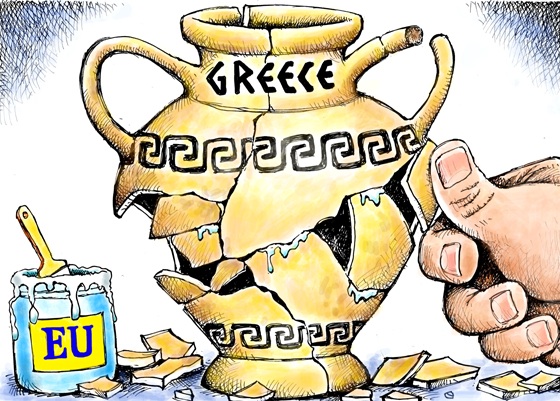It was just over a year ago that Greece elected Alexis Tsipras and Syriza amid a flurry of anti-austerity sentiment.
Things didn’t exactly go as planned.
The new PM and his “radical” finance minister Yanis Varoufakis thought they could shake things up in Brussels and wrench Greece from the clutches of Berlin-style fiscal rectitude. As it turns out, Wolfgang Schaeuble is not a man who is easily bested at the bargaining table and after more than six months of negotiations, the imposition of capital controls, a referendum on the euro that Tsipras promptly sold down the river, Greeks ended up facing an outright depression.
In the end, Varoufakis unceremoniously resigned and Tsipras agreed to a third bailout before calling for snap elections that would ultimately see the PM re-elected albeit at the helm of a party that was completely gutted by the arduous bailout talks.
As we and quite a few others warned, the new bailout and the attached terms would do exactly nothing to turn the Greek economy around. We’re all for being responsible with the budget but you can’t very well implement fiscal retrenchment during a depression unless you intend to remain in said depression in perpetuity, but alas, that’s exactly what Brussels forced Greece to do and the country has slipped back into recession.
With opposition mounting to the government’s pension reform plan, the European Union pressuring it to stem the tide of refugees entering the country and the global market rout hastening the sell-off in Greek assets, dark clouds are gathering again. Ironically, capital controls appear to have helped the economy perform better than expected: “The economy fared less badly than those initial expectations in part due to a 90 percent annualized increase in cashless payments since the introduction of capital controls in June, shifting activity out of the shadow economy.” Another justification for banning cash we suppose.
Earlier this month we noted that Greek bank stocks were cut in half in just a matter of 72 hours while Greek equities as a whole had fallen to their lowest levels since 1989. Yields on the Greek 10Y had spiked back above 10%.
Greece, sources told MNI, “seems unable to deliver” on a number of measures Brussels says Athens needs to implement an effective fiscal consolidation plan. “We agreed to disagree,” one official said. “Judging from (last week’s) talks, the negotiations could drag for months. Anyway, I don’t see any real funding needs for Greece until June,” the official went on to note.
Greek riot police fired tear gas at farmers protesting against pension reform plans on Friday who hurled stones at the agriculture ministry in central Athens ahead of a major demonstration outside parliament scheduled for later in the day,
Greece is not “fixed.” And even as the farmers swear “they won’t make us bend,” something will have to give because Grexit fears to resurface once again [if all sides adopt] a plan built on over-optimistic assumptions.
Throw in a couple of hundred thousand refugees that are lliterally arriving in boats and you’ve got a particularly precarious situation that will likely devolve into the type of chaos shown above on an increasingly frequent basis.

